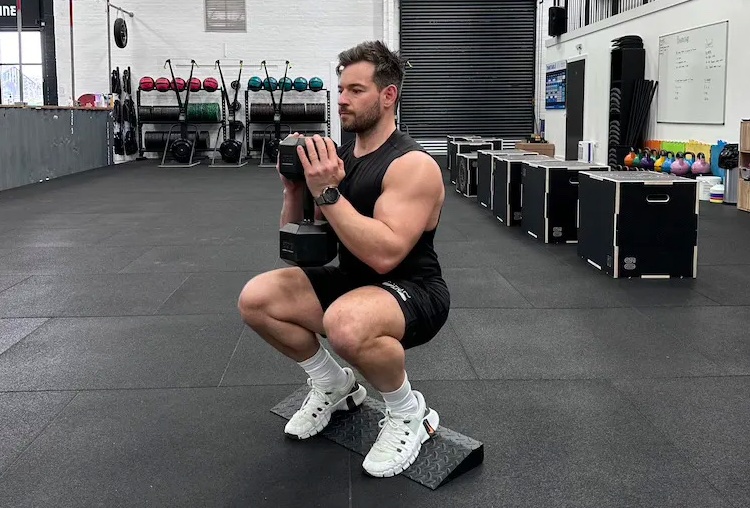When it comes to developing stability as well as strength, dumbbells are my go-to weapon of choice. That’s because they require the body to stabilise and control more directions of load than a barbell or machine. So if you’re looking for a seriously tough and highly effective dumbbell-only leg workout, grab a pair of dumbbells and get ready to go to work on your lower body.
When training your lower torso, you can’t really go wrong with a concentration of hip- and knee-dominant movements, using some isolation exercises to finish. When you select your weights for each exercise, use one to two sets to familiarise yourself with the pattern and load placement. That way you ensure you’ll get the most out of your working sets.
This isn’t supposed to be an easy session so don’t shy away from intensity. Select the right weight for you so you can balance intensity with movement proficiency. While you don’t want to go too light, don’y go extra-heavy either. You won’t feel the full benefits of this workout if your form starts to suffer after the first set.
The added benefit of this workout is that it’s space-efficient. If it’s leg day but the gym’s packed out, keep this dumbbell-only leg workout in your back pocket, because all it requires is a patch of floor and some suitably heavy weights.
Why you can trust the workouts in Men’s Fitness
At Men’s Fitness we pride ourselves on delivering information that serves a singular purpose: to improve some aspect of your health, fitness or wellbeing. For almost 20 years, we’ve been publishing authoritative health and fitness content – written by our expert editors and contributors – in the form of the monthly Men’s Fitness magazine. Each of our workouts has been created by either a highly experienced editor or expert contributor, and has been tested and used in real-world situations. This dumbbell-only leg workout was created by PT and founder of The Movement Blueprint, Harvey Lawton. A long-time contributor to Men’s Fitness, he knows more than most about effective workout programming, as this space-saving dumbbell-only leg workout proves.
The exercises in this dumbbell-only leg workout
Warm-up
2 rounds of the following:
Strength block 1
3 sets of the following:
Strength block 2
3 rounds of the following:
Hypertrophy block
3 rounds of the following:
- Dumbbell single-leg RDL x 8
- Hanging weighted knee raise x 8-12
- Dumbbell bent-knee calf raise x 12-15
Here’s how to do this dumbbell-only leg workout
Warm-up
1. Heels-elevated dumbbell goblet squat
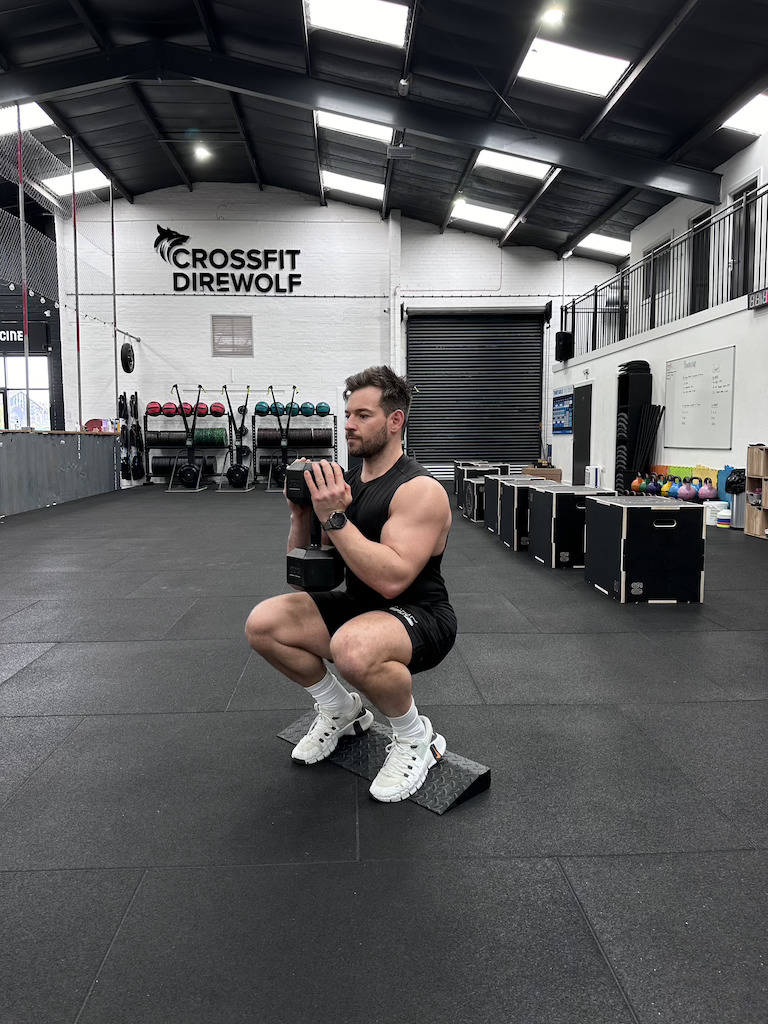
| Reps | 5 |
| Rest | Go straight into the next exercise |
Elevating your heels allows you to sink deeper into the squat, giving a more extensive range of motion. I really like this movement as a means of firing up the quads before the main workout begins.
- Elevate your heels on a couple of weight plates positioned on the floor, with feet shoulder-width apart
- Hold the dumbbell about three inches away from your sternum. This will allow you to counterbalance and create a nice upright torso and knees-forward squat position
- Perform as an eccentric movement, with a tempo of 3 seconds down, 2 seconds pause and 2 seconds up
2. Weighted side plank
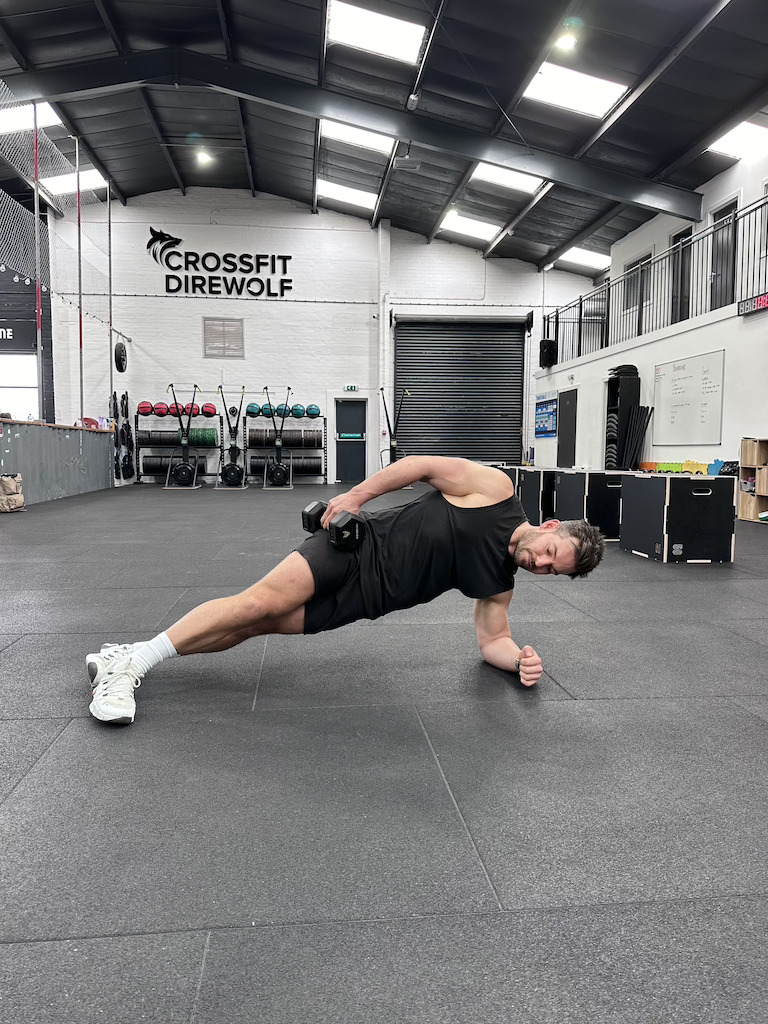
| Reps | 5 |
| Rest | 90 secs, then repeat exercise 1 |
I always incorporate some core work into my workouts, and the additional resistance here will challenge your stability and balance. That’s good news when it comes to strengthening the muscles that support your spine. You only need a light weight, though.
- Place the dumbbell on your top hip and focus on pushing your hips laterally away from the floor. This will get your hip abductors and lateral core working hard, which are key contributors to lower-body performance
- Drive your elbow into the floor and down towards your foot position to create tension
Complete 2 rounds of the above exercises.
Strength block 1
3. Dumbbell goblet squat
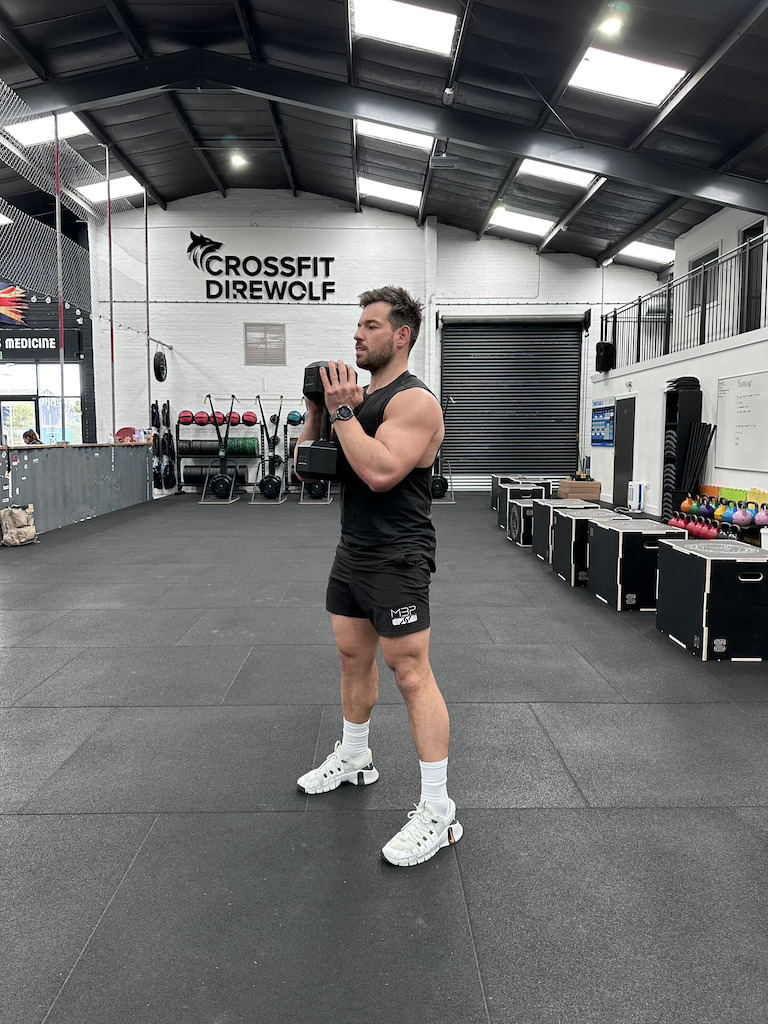
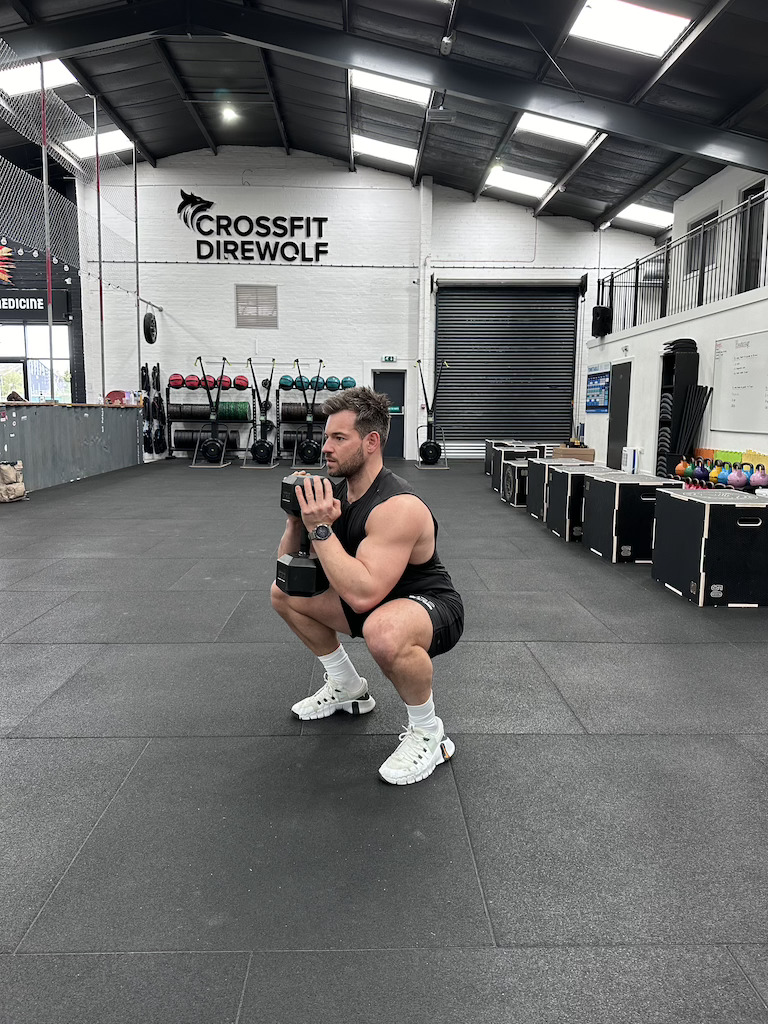
| Reps | 12-15 |
| Rest | 2 mins |
| Sets | 3 |
I like how functional goblet squats are: getting good at picking the weight up off the floor and squatting with it will only benefit you in day-to-day life. Keeping your torso upright also works your core some more, after the weighted side planks.
- Hold a dumbbell close to your chest with both hands, keeping your elbows pointing down
- Stand with your feet shoulder-width apart and toes slightly turned out, maintaining a straight back and engaged core
- Bend at the knees and hinge at the hips, keeping your chest up and heels on the ground, to squat down until your hips are below parallel
- Push through your heels to return to the starting position, squeezing your glutes at the top
- Target 40-50% of your bodyweight – these should be working sets at a rate of perceived exertion (RPE) of 8
Strength block 2
4. Dumbbell Romanian deadlift (RDL)
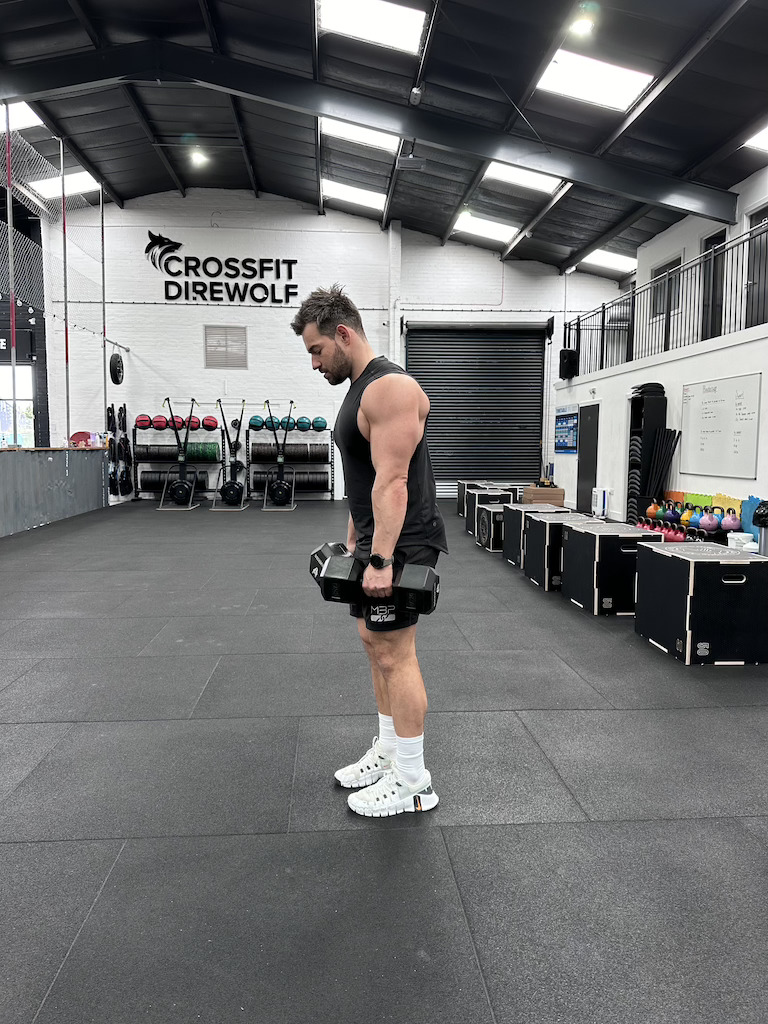
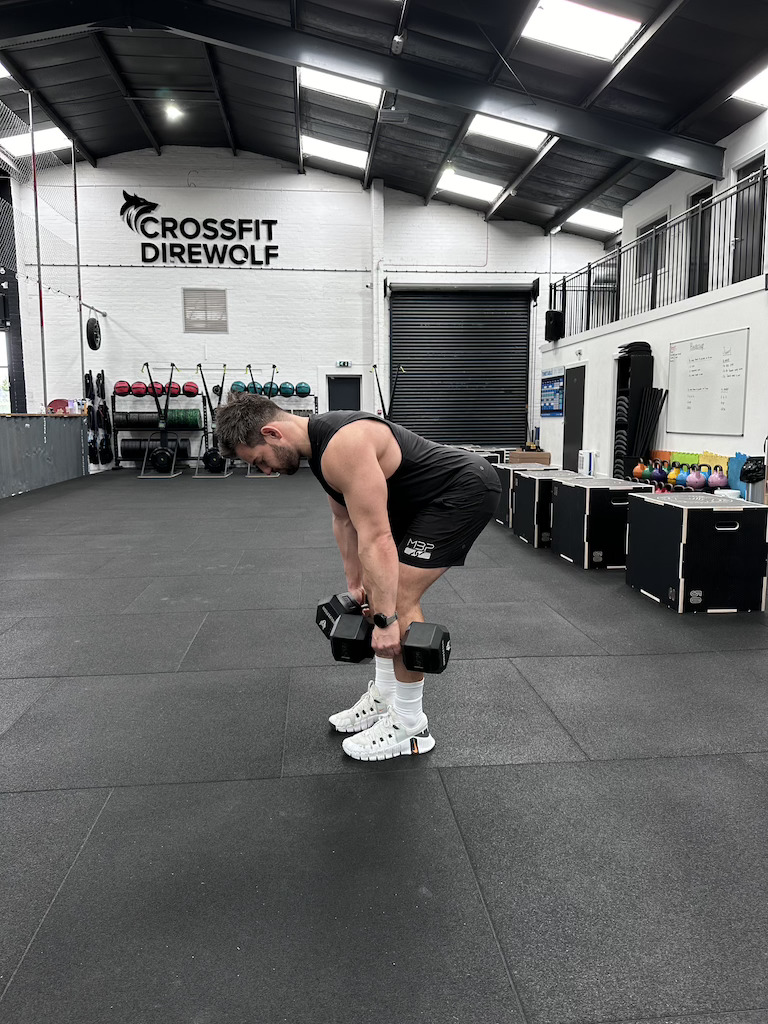
| Reps | 8 |
| Rest | 30 secs, then move on to the next exercise |
I often programme dumbbell RDLs over the barbell variety, particularly for less seasoned gym-goers, because some people find that the dumbbell variation puts less strain on the lower back and allows for a more natural movement pattern.
- Begin by holding a pair of dumbbells in front of your thighs with an overhand grip, standing with your feet hip-width apart and knees slightly bent
- Keeping your back straight, hinge at the hips and lower the dumbbells towards the ground by pushing your hips back, maintaining a slight bend in your knees
- Lower the dumbbells until you feel a stretch in your hamstrings, keeping them close to your body. Then, engage your hamstrings and glutes to return to the starting position by driving your hips forward
- Keep your core tight throughout the movement to stabilise your spine
- Execute these with a 2-second pause at the bottom of each rep
- Think about pushing your hips back while keeping your sternum over your midfoot
5. Dumbbell walking lunge
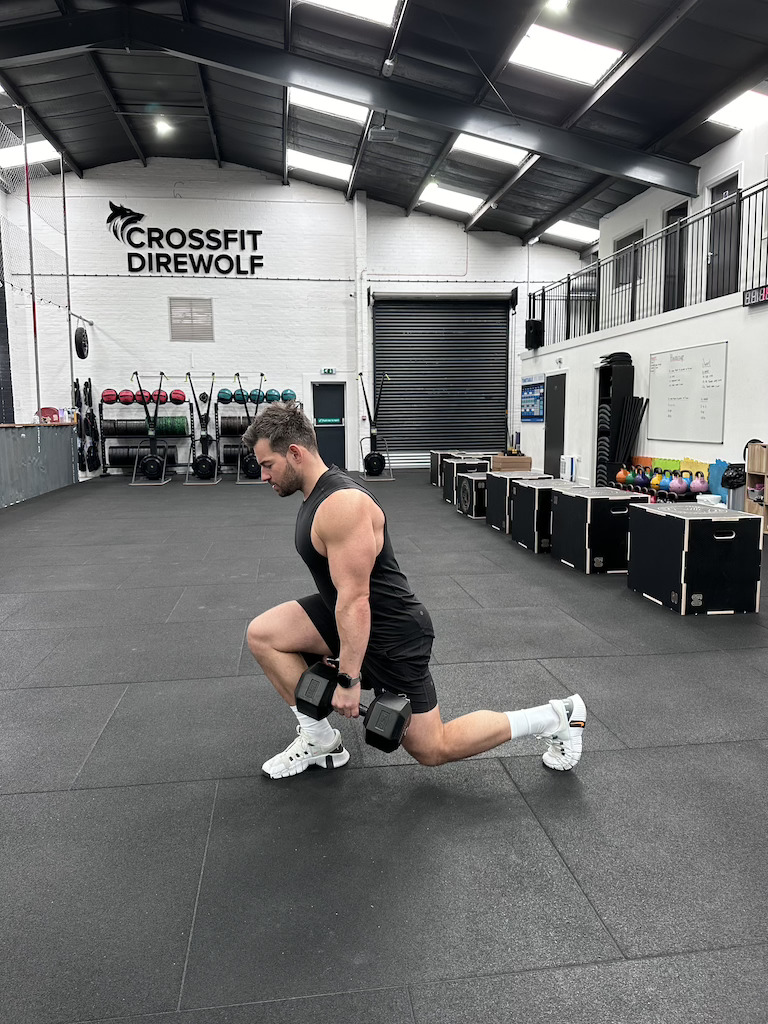
| Reps | 12 |
| Rest | 2 mins, then repeat exercise 4 |
This is another favorite functional exercise of mine. Not only do these replicate natural movement patterns, but they also challenge balance and proprioception. Equally, use a heavy enough weight and these will seriously elevate your heart rate for an aerobic fitness benefit.
- Begin by holding a dumbbell in each hand, standing tall with your feet hip-width apart
- Take a large step forward with one foot, lowering your body towards the ground by bending both knees until your back knee lightly brushes the floor and your front thigh is parallel to the ground
- Push through the heel of your front foot to return to a standing position, bringing your back foot forward to meet the front foot
- Repeat the movement with the opposite leg, alternating legs with each step to perform walking lunges
- Keep your core engaged and maintain an upright posture throughout
- Target a weight increase between rounds and use lifting straps if grip becomes the limiting factor – especially after the RDLs
Complete 3 rounds of the above exercises.
Hypertrophy block
6. Dumbbell single-leg RDL
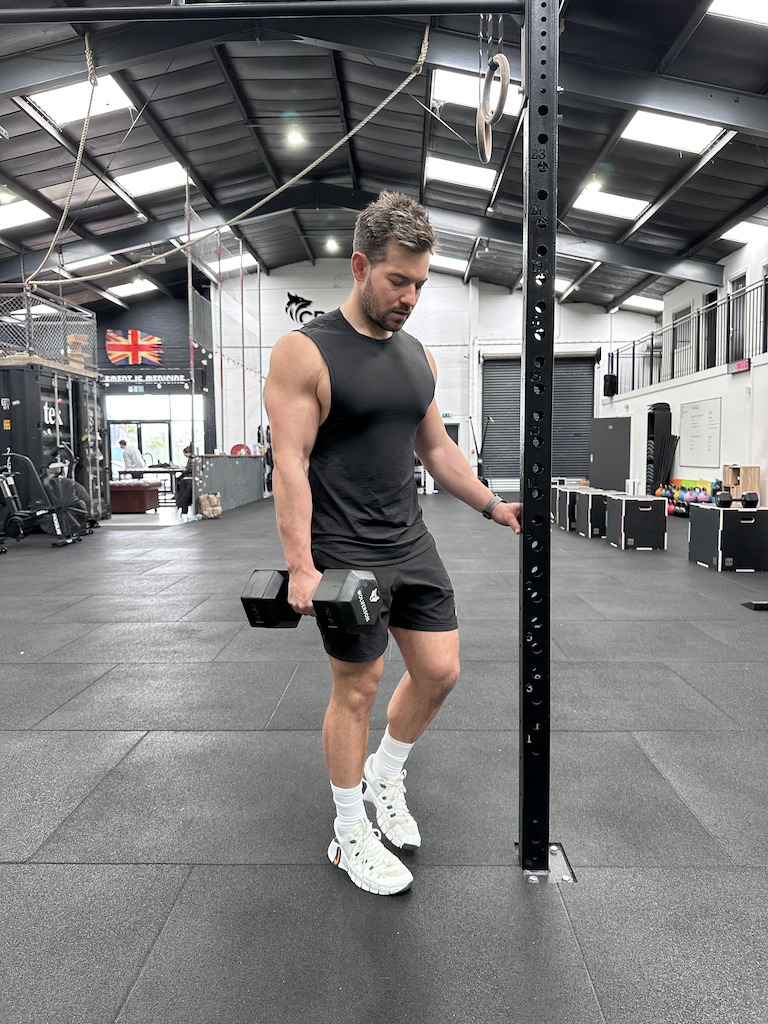
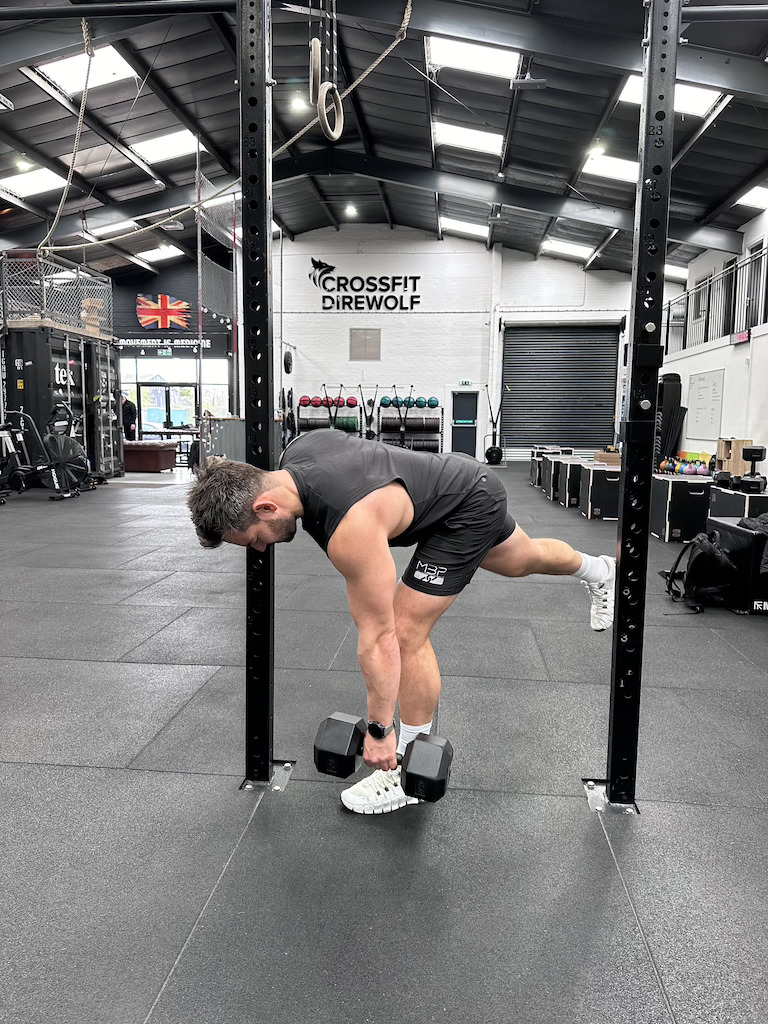
| Reps | 8 |
| Rest | Go straight into the next exercise |
After the regular RDLs, the single-leg variety will obviously target each leg individually. That’s worthwhile, because it’s going to help to address any muscular imbalances and develop strength in each leg separately. I also like how these work the hips and will help you hone your hip hinge.
- Begin by holding a dumbbell in one hand outside your leading leg, with the other hand holding onto a rack or similar sturdy object
- Keeping your back straight and core engaged, hinge forward at the hips while simultaneously lifting your non-supporting leg behind you, creating a straight line from your head to your lifted heel
- Lower the dumbbell towards the ground while maintaining a slight bend in the knee of your supporting leg, feeling a stretch in your hamstring
- Engage your hamstring and glutes to return to the starting position, driving your hips forward and bringing your lifted leg back down
- Take a 2-second tempo on the way down, pause for 2 at the bottom of the movement, then drive back up
7. Hanging weighted knee raise
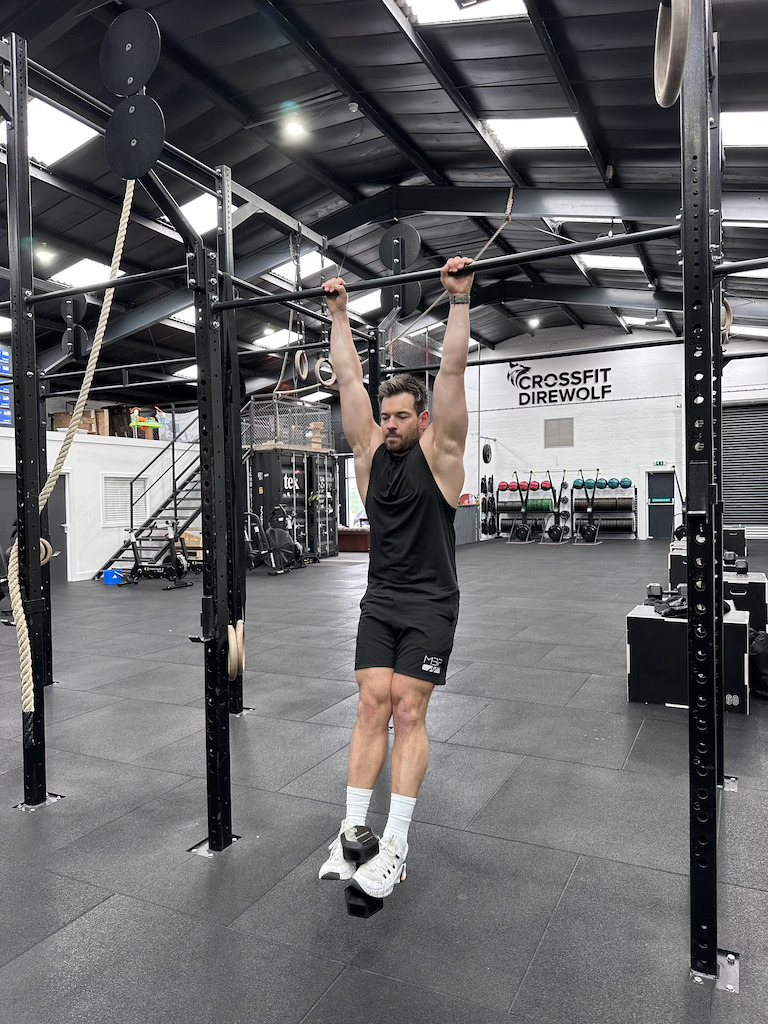
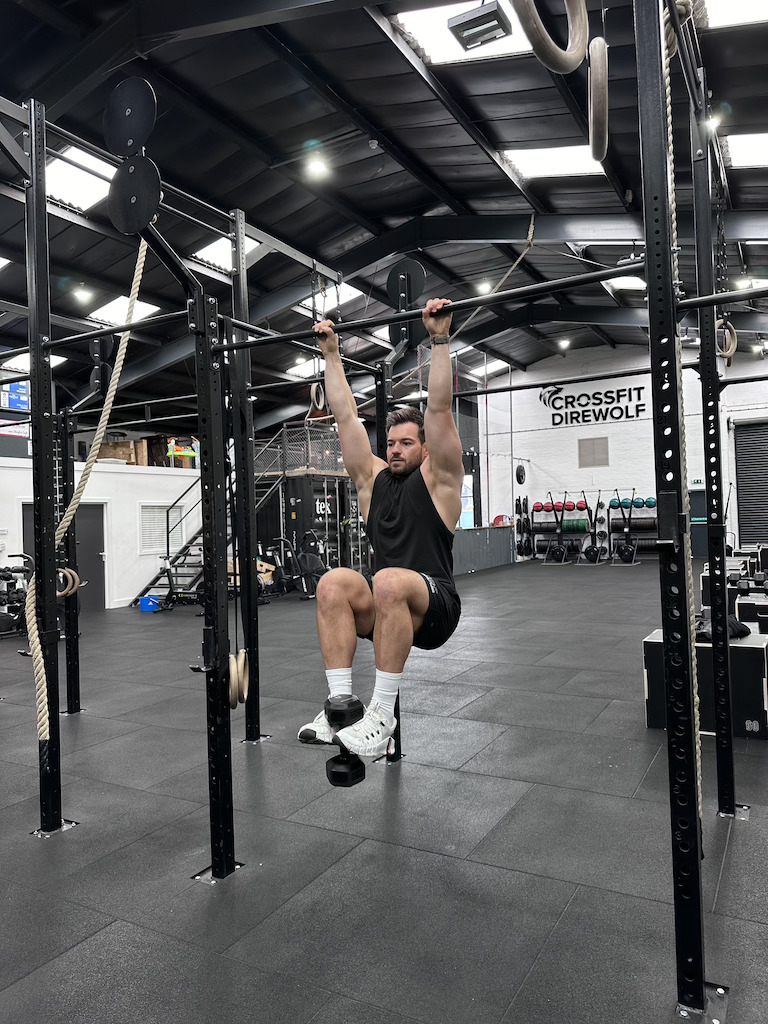
| Reps | 8-12 |
| Rest | Go straight into the next exercise |
This is an exercise I love to hate. It’s brutal, but highly effective at working the lower abdominals, particularly the rectus abdominis. Your grip strength will also improve, and the weighted element allows for an easy means of progressive overload.
- Hang from a pull-up bar with an overhand grip, allowing your body to fully extend and keeping your legs straight.
- Hold a light dumbbell securely between your feet
- Engage your core and bend your knees, raising them towards your chest while keeping your upper body stationary
- Pause briefly at the top of the movement, then slowly lower your legs back down to the starting position
- Aim for 10% of your bodyweight. If that’s too challenging to get the desired range of motion (pictured), do the movement without the dumbbell
8. Dumbbell bent-knee calf raise
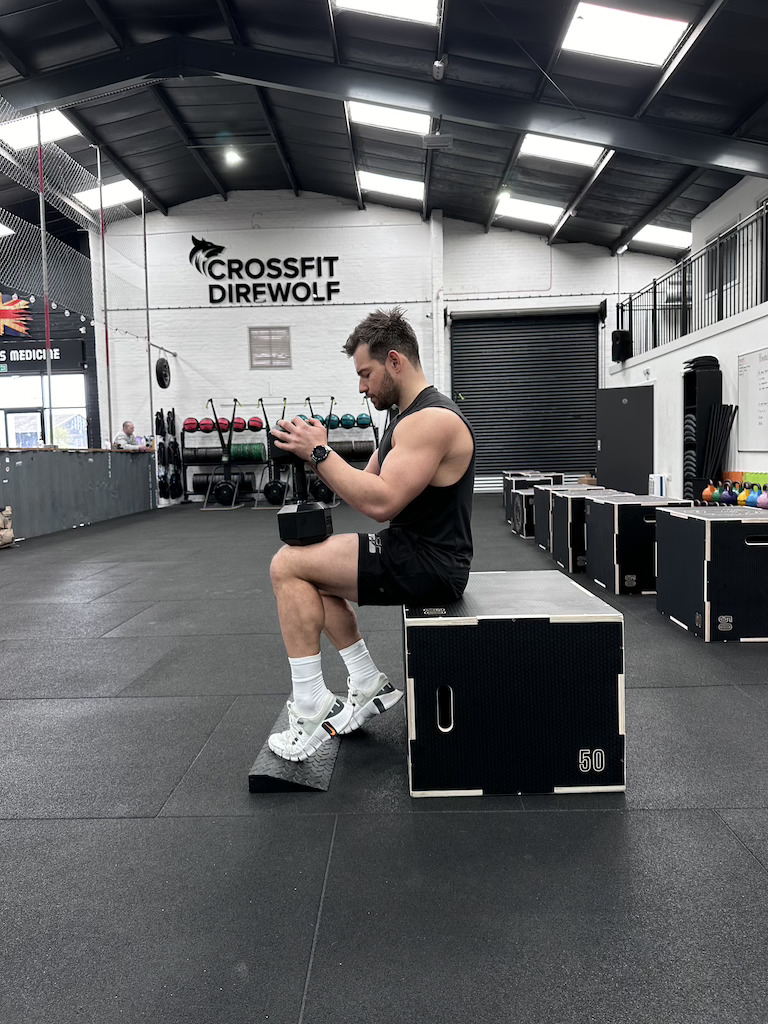
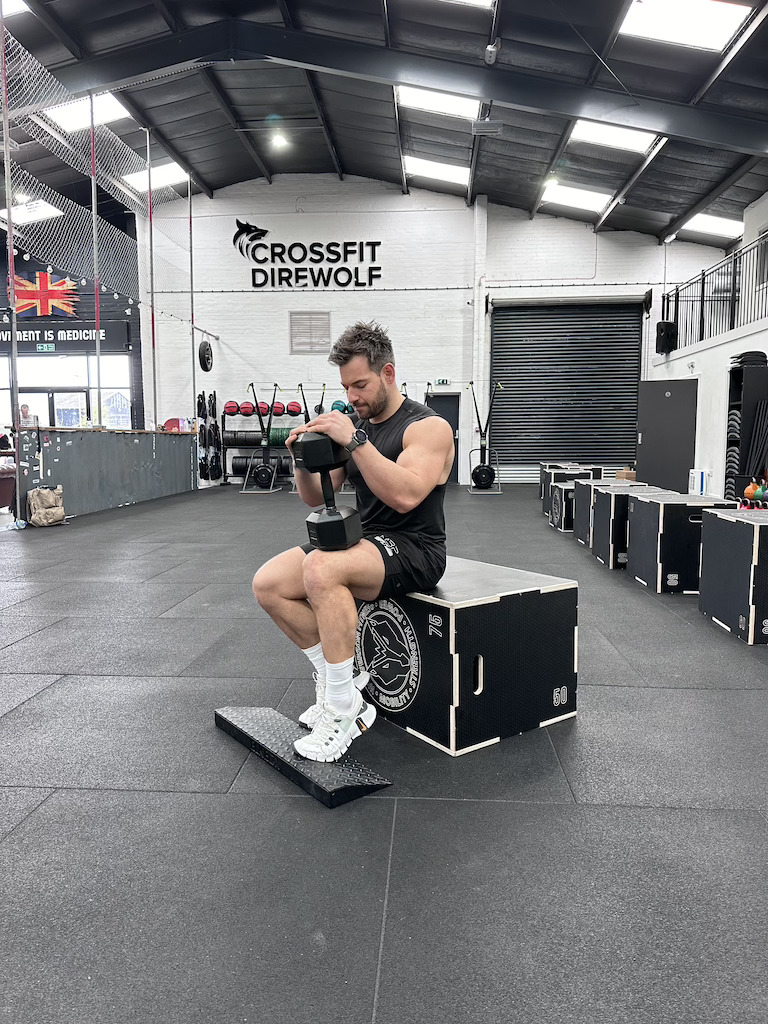
| Reps | 12-15 |
| Rest | 60 secs, then repeat exercise 6 |
Calves are notoriously stubborn muscles to grow. I like bent-knee raises because they really isolate the calf muscles, allowing for focused, targeted strengthening without the involvement of other muscle groups.
- Sit on a bench or chair with your feet flat on the ground and a dumbbell placed securely on your thigh
- Keeping your knee bent at a 90-degree angle, raise your heel as high as possible by pressing through the ball of your feet, contracting your calf at the top of the movement
- Lower your heel back down to the start with control
- Place a big emphasis on the eccentric phase, lowering for 3 seconds, then pausing for 2 at the top of the movement
Complete 3 rounds of the above exercises.
Follow this up with my favourite stretching exercises to avoid any post-workout muscle soreness. And if you’re in need of a set of dumbbells, check out the cut-price deal below.

